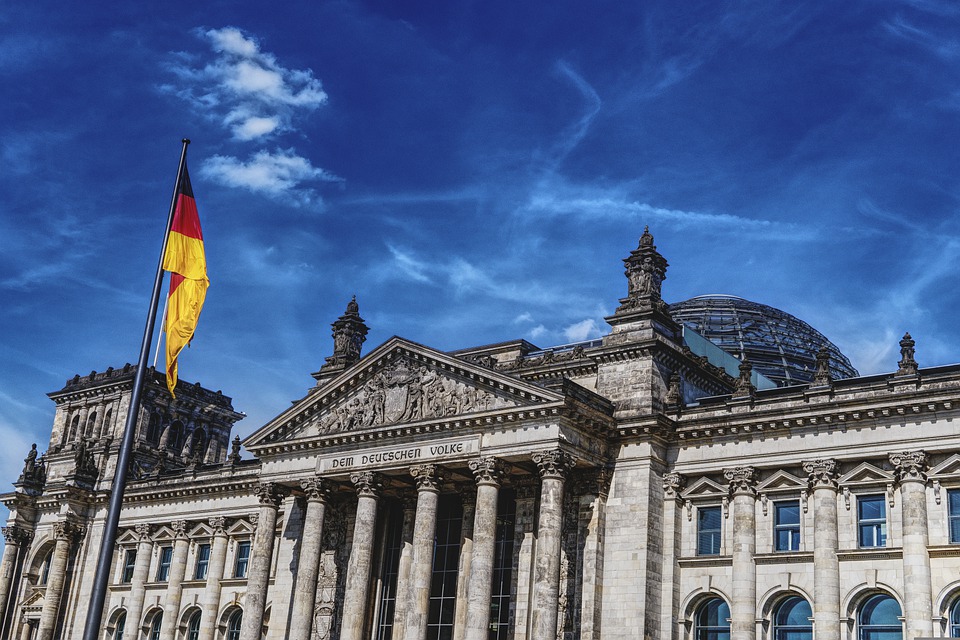Author: Julia Sun
In 2021, the OECD Development Assistance Committee's peer review of Germany's development cooperation concluded that Germany is firmly committed to sustainable development and climate change and aims to achieve a fair and sustainable globalization.
Total words3177About6minutes
The 2021 peer review of German development cooperation by the OECD Development Assistance Committee (OECD DAC) believes that Germany is firmly committed to sustainable development and climate change, and promotes fair and sustainable globalization. Germany supports the provision of global public goods to address global challenges and contributes to shared global responsibilities for health and safety, orderly and regular migration. Previously, DAC conducted peer reviews on Germany in 1998, 2001, 2005, 2010, and 2015.
OECD DAC Peer Review Development Assistance Committee conducts systematic peer reviews of the development cooperation systems and policies of some member countries every year to improve the effectiveness of development cooperation, promote good development partnerships, and better support developing countries. Poverty reduction and sustainable development agenda.
DAC members undergo peer review on average every five to six years. The peer review panel consists of the DAC Secretariat, reviewers and observers. Commentators are sent by two other DAC member countries, while observers are non-DAC member countries, partner countries or stakeholders such as civil society organizations.
The peer review process includes discussion of review priorities, fieldwork, research and consultation, visits to relevant government departments in member states, and visits to one or more partner countries. The peer review team produces peer review reports based on input and other evidence from member state staff, key institutions, partners and stakeholders. Follow-up to peer review includes voluntary management responses and mid-term reviews. Germany is the second largest provider of official development assistance among DAC members. In 2021, Germany's total official development assistance reached US$32.2 billion, rising to 0.74% of gross national income (GNI). Germany’s official development assistance as a share of gross national income ranks fourth among DAC member countries. In May 2020, the German Federal Ministry for Economic Cooperation and Development (BMZ) released the "2030 Reform Strategy", which set the fight against hunger and poverty and the realization of the 2030 Sustainable Development Agenda as the main goals of foreign aid. After the Schulz government came to power, it promised that Germany's official development assistance would remain at the level of GNI 0.7%, of which official development assistance accounting for 0.2% of gross national income would be used for the least developed countries. The new government focuses on areas such as combating COVID-19, climate change, global health and research and development, gender equality and sustainable agriculture and forestry.
Belgium and the Netherlands will send personnel to participate in the peer review of Germany in 2021, while Romania will send observers. The peer review team communicated with relevant institutions and partners in Germany in October and November 2020, and communicated with major institutions and partners in Rwanda and Tunisia in December and January 2021 respectively. The peer review report believes that Germany has outstanding performance in two major aspects.
Sustainability drives German development cooperation approach
Germany attaches great importance to the rules-based multilateral order and fair and sustainable globalization.As a global power, Germany is trusted and admired for its strong economy and stable leadership. Germany recognizes that the 2030 Agenda for Sustainable Development and the Paris Agreement on climate change are crucial for domestic and global well-being. Germany is committed to world peace, freedom and security and leads by example in taking responsibility. In order to support fair and sustainable globalization, Germany began to accept a large number of refugees in 2015. In addition, Germany promotes the "Green Button" initiative to change consumer behavior and raise awareness of sustainable global value chains, the impact of which may extend throughout Europe.
Germany has made hunger, refugees, the Middle East and North Africa, and jobs political priorities.Germany proposed four special initiatives: "One World - No Hunger", "Addressing the Root Causes of Displacement - Refugee Reintegration", "Middle East and North Africa" and "Training and Job Creation" and guaranteed sufficient resources. When Germany held the G20 presidency in 2017, it launched the "Compact with Africa" initiative, promoting 12 countries to join the initiative and increasing private investment in Africa. In addition, Germany reformed its partnerships with six African countries from traditional donor-recipient relationships to new ones focused on sustainable economies. In 2018, the Federal Ministry for Economic Cooperation and Development launched an African version of the Marshall Plan to reform partnerships and create jobs.
Germany has leadership and expertise in development cooperation.Germany is committed to upholding the rules-based multilateral order and improving the performance and effectiveness of multilateral organizations by investing in existing global governance mechanisms. The German development cooperation mechanism has sufficient resources, dedicated government ministries, the participation of 16 federal states and municipalities, and professional institutions. The Federal Ministry for Economic Cooperation and Development, KfW and GIZ all have strong and diverse executive organizations with deep technical and geographical expertise.
Germany has increased investment in global health to support developing countries in responding to the COVID-19 epidemic.In the early days of the COVID-19 outbreak, the German Federal Ministry for Economic Cooperation and Development adjusted its fund allocation plan to provide emergency relief and services to displaced people and strengthen crisis management to address the impact of the crisis on the health and economy of developing countries. In June 2020, the Federal Ministry for Economic Cooperation and Development announced an additional 3.1 billion euros in official development assistance as part of the national fiscal stimulus plan. In February 2021, Germany once again announced an additional 1.5 billion euros for global medical support. So far, Germany's total funding to deal with the new crown has reached 6.2 billion euros.
Germany has rich development cooperation methods and diverse partners.
Germany plays a more important role in the sustainable development financing agenda.Through KfW and the German Investment and Development Corporation (DEG), the Federal Ministry for Economic Cooperation and Development and the German Chamber of Commerce abroad use a rich set of mechanisms and tools to strongly support the private sector participation in sustainable development in partner countries. The insurance product management climate, credit and other risk management products provided by Germany are at the leading international level. KfW has long experience in cooperating with developing countries to issue green bonds, and its current portfolio value has reached 2 billion euros. Germany's new African Development Investment Fund is expected to strengthen private sector investment in Africa and promote Africa's foreign trade.
Germany actively uses financial and technological tools and advocates innovative models such as trilateral cooperation.Germany participates in joint EU programmes, as well as co-financing with other development partners and multilateral organizations, and tailors aid to the needs of partner countries. The Federal Ministry for Economic Cooperation and Development, KfW and GIZ have developed an ambitious comprehensive innovation and digitalization programme. The Federal Ministry of Economic Cooperation and Development has set up a special agency to issue a digital strategy. The German Agency for International Cooperation and KfW have set up teams and projects to promote innovation and digitalization on a global scale through blockchain technology, artificial intelligence and other technologies.
German development cooperation is supported by civil society organizations, research and evaluation institutions, charities and the private sector.CSOs facilitate grassroots exchanges, maintain local networks in partner countries, and contribute to leaving no one behind by working with marginalized groups. Investments by German companies in partner countries help create jobs and improve skills. The well-known German Development Institute (DIE) provides information and decision support for government decision-making. The German Institute for Development Evaluation (DEval) provides independent and strategic assessments and experience for development cooperation.
In addition, the review report believes that Germany can work hard to improve development effectiveness in the following aspects:
Systematic benchmarking against sustainable development goals
First, systematic benchmarking of the Sustainable Development Goals can help address the spillover effects of Germany’s domestic policies on developing countries.Germany should systematically analyze possible inconsistencies in existing and future policies and regulations, take remedial measures to address possible negative impacts in developing countries, identify actions that need to be taken by federal ministries and agencies, and follow up, review and Report implementation results.
The second is to increase support for gender equality and focus on leaving no one behind.To achieve the ambitious gender action plan, the Federal Ministry for Economic Cooperation and Development and its partners should invest more in gender equality and women’s empowerment, increase human resources for gender equality and improve staff capabilities. In addition, Germany should further develop guidance and more closely monitor the extent to which relevant investments contribute to reducing poverty and inequality.
The third is to increase investment in strategic assessment and continue to strengthen the results of development cooperation.German development cooperation is focused on achieving the 2030 Agenda and the Sustainable Development Goals and is aligned with the priorities of partner countries. However, Germany has yet to develop a unified articulation and comprehensive assessment of its development goals at the national, regional and global levels. Strengthening Germany's comprehensive data management system and establishing a wide range of quantitative and qualitative indicators will help improve communication and accountability. The Federal Ministry for Economic Cooperation and Development could consider recruiting professionals to manage results and ensure that results are applied effectively throughout the German development cooperation system.
Improving cross-departmental coordination in the German government
Fourth, the Federal Ministry of Economic Cooperation and Development should clarify its strategic vision and strengthen inter-ministerial coordination.The Federal Ministry for Economic Cooperation and Development and the Ministry of Foreign Affairs should strengthen coordination and complementarity in fragile and crisis situations. The Federal Ministry for Economic Cooperation and Development and the Foreign Ministry are responsible for most programs in crisis situations in Germany, but manage their own funds and projects separately. Such an arrangement could place additional burdens on Germany's crisis response and on Germany's partners in the humanitarian, development and peace fields. The revision of the 2012 Guidelines for the Ministry of Foreign Affairs and Economic Cooperation’s tasks in fragile situations will help to avoid duplication of work by Germany and its multilateral and civil society cooperation agencies and will also help to strengthen fragility while maintaining the independence of the ministries. Complementarity in the implementation of assistance by different German ministries.
The fifth is to expand the authorization of embassies and country offices abroad and improve transparency.The review suggested improving Berlin's decision-making mechanism in two aspects. On the one hand, more personnel from the Federal Ministry of Economic Affairs will be seconded to embassies abroad to improve staff capabilities and promote a more flexible and effective way to participate in national-level development cooperation. On the other hand, Germany should clarify bilateral development cooperation goals in the national strategies of partner countries and share development cooperation goals with partner countries, as well as relevant information on other development cooperation activities funded by Germany.
References:
https://www.oecd.org/dac/peer-reviews/Germany-2021-Infographic.pdf
https://www.oecd-ilibrary.org/sites/0079f636-en/index.html?itemId=/content/component/0079f636-en
Past review
- Deciphering Germany's New International Development Policy
- Recapping International Development in 2021
- Seven Principles Likely to Influence Germany's Post-Election Development Cooperation Policies
- UK's 30% Reduction in Foreign Aid Budget Raises Concerns
- New Administrator Outlines Three Priorities for USAID
- New Trends in U.S. Development Cooperation Revealed by the 2022 Budget Proposal

